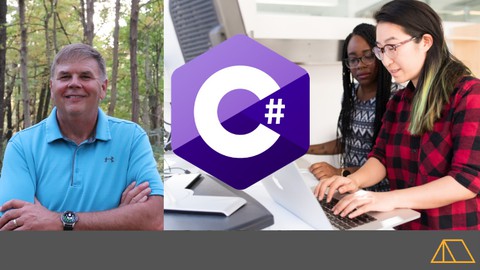
Software Development Master Class – Intermediate C#
Software Development Master Class – Intermediate C#, available at $49.99, has an average rating of 4.5, with 39 lectures, based on 64 reviews, and has 13927 subscribers.
You will learn about Learn about intermediate topics such as arrays, program logic flow, classes, multi-tier applications, data structures, and exception handling. Intermediate software development with Microsoft .Net and C#. Introduction to Object-Oriented Programming (OOP) and Object-Oriented Design (OOD) Learn important concepts and techniques which can be applied to real-world professional situations. This course is ideal for individuals who are Beginners who are interesting in becoming professional software developers. It is particularly useful for Beginners who are interesting in becoming professional software developers.
Enroll now: Software Development Master Class – Intermediate C#
Summary
Title: Software Development Master Class – Intermediate C#
Price: $49.99
Average Rating: 4.5
Number of Lectures: 39
Number of Published Lectures: 39
Number of Curriculum Items: 45
Number of Published Curriculum Objects: 45
Original Price: $39.99
Quality Status: approved
Status: Live
What You Will Learn
- Learn about intermediate topics such as arrays, program logic flow, classes, multi-tier applications, data structures, and exception handling.
- Intermediate software development with Microsoft .Net and C#.
- Introduction to Object-Oriented Programming (OOP) and Object-Oriented Design (OOD)
- Learn important concepts and techniques which can be applied to real-world professional situations.
Who Should Attend
- Beginners who are interesting in becoming professional software developers.
Target Audiences
- Beginners who are interesting in becoming professional software developers.
In this course I will set you on a path that can take you from absolute beginnerto professional software developer. This is not something that you can do in an afternoon, but this intermediate course is a start. My name is Mike Witt and I’m developing this course as the second step in a program that is intended to provide all the information that you will need to become a programmer with skills in a particular area: Developing web applications built around a .Net server, SQL Server database, and an Angular based UI. This course is the second step, but if you stick with it you can turn your learning and hard work into a career.
If you’ve glanced at my bio, you will note that I’ve been developing software for over 35 years. When I started, I had no idea what programming was. You may only have a basic understanding, but programming (unlike rocket science) is more of a skill and a craft than a theoretical science (like rocket science)! Because of this and because of a shortage of workers, many companies are willing to hire someone even if they don’t meet their educational requirements. To be sure, most companies want a degree in computer science or at least some degree in a science or related field, but when it comes right down to it they want and need someone who can do the work.
This program will help you leap over the education gap by, not only understanding the technical nuts and bolts, but also by projecting your thinking and personality as someone who can do and understand software development. Here are some of the very important topics you will learn as part of this course:
– An in-depth look at variables and their capabilities as well as date and time types and arrays.
– Build more program logic elements into your applications with foreach loops and switch/case branches.
– Get a start on developing object-oriented programs with classes, methods, properties, and constructors.
– Find out how to build an application with a mult-tier architecture using object-oriented design techniques.
– Use object relationships, exception handling, logging, and data persistence to build first-class applications.
– Understand how data structures work to provide efficient and fast access to data.
– Finally, you will learn about various .Net libraries that can help with common programming tasks such as lists, dictionaries, and files.
I am truly excited to share my knowledge and my enthusiasm for developing software with you. Come on this journey and I will do my best to help you learn, enjoy, and finally become part of a community of developers who make this world go round!
This course comes with detailed explanations of each concept along with working examples for each programming assignment and a Verifiable Certificate of Completion.
Course Curriculum
Chapter 1: Introduction
Lecture 1: Course Introduction
Lecture 2: Course Overview
Lecture 3: Review of Basic Programming
Lecture 4: Assignments & Code Examples
Lecture 5: Load Development Environment
Chapter 2: More Fun With Variables
Lecture 1: Fun With Variables
Lecture 2: Value Type Variables
Lecture 3: What Time is it? Date & Time Variables
Lecture 4: All About Strings
Lecture 5: More is Better – Arrays
Chapter 3: Program Organization and Logic
Lecture 1: Organizing Our Programs
Lecture 2: More Logic Flow Choices
Lecture 3: Let's Function!
Chapter 4: A Touch of Class
Lecture 1: A Touch of Class
Lecture 2: Classes & Objects
Lecture 3: Constructors, Overloading, and Properties
Lecture 4: Structs, Value Types for a Class
Lecture 5: .Net Libraries: Lists and Files
Chapter 5: Multi-Tier Objected-Oriented Applications
Lecture 1: Building an Object-Oriented Application
Lecture 2: Introduction to Object Oriented Design
Lecture 3: Architectural Layering
Lecture 4: Inserting Object Instances
Lecture 5: Building Relationships
Lecture 6: Handling Errors
Lecture 7: Data Persistence
Lecture 8: Logging and Bug Analysis
Chapter 6: Data Structures
Lecture 1: Introduction to Data Structures
Lecture 2: Organization of Data
Lecture 3: Updates to School Application
Lecture 4: Sorting a Linear List
Lecture 5: Binary Search on a Sorted List
Lecture 6: Binary Trees – Building
Lecture 7: Binary Trees – Walking
Lecture 8: Binary Trees – Searching
Lecture 9: Using a .Net Dictionary To Manage a List
Chapter 7: Wrap-Up
Lecture 1: You Made It!
Lecture 2: What We Learned
Lecture 3: Thank You!
Lecture 4: Bonus Lecture
Instructors
-
Mike Witt
Senior Software Engineer
Rating Distribution
- 1 stars: 0 votes
- 2 stars: 1 votes
- 3 stars: 5 votes
- 4 stars: 22 votes
- 5 stars: 36 votes
Frequently Asked Questions
How long do I have access to the course materials?
You can view and review the lecture materials indefinitely, like an on-demand channel.
Can I take my courses with me wherever I go?
Definitely! If you have an internet connection, courses on Udemy are available on any device at any time. If you don’t have an internet connection, some instructors also let their students download course lectures. That’s up to the instructor though, so make sure you get on their good side!
You may also like
- Top 10 Mobile App Development Courses to Learn in December 2024
- Top 10 Graphic Design Courses to Learn in December 2024
- Top 10 Videography Courses to Learn in December 2024
- Top 10 Photography Courses to Learn in December 2024
- Top 10 Language Learning Courses to Learn in December 2024
- Top 10 Product Management Courses to Learn in December 2024
- Top 10 Investing Courses to Learn in December 2024
- Top 10 Personal Finance Courses to Learn in December 2024
- Top 10 Health And Wellness Courses to Learn in December 2024
- Top 10 Chatgpt And Ai Tools Courses to Learn in December 2024
- Top 10 Virtual Reality Courses to Learn in December 2024
- Top 10 Augmented Reality Courses to Learn in December 2024
- Top 10 Blockchain Development Courses to Learn in December 2024
- Top 10 Unity Game Development Courses to Learn in December 2024
- Top 10 Artificial Intelligence Courses to Learn in December 2024
- Top 10 Flutter Development Courses to Learn in December 2024
- Top 10 Docker Kubernetes Courses to Learn in December 2024
- Top 10 Business Analytics Courses to Learn in December 2024
- Top 10 Excel Vba Courses to Learn in December 2024
- Top 10 Devops Courses to Learn in December 2024






















